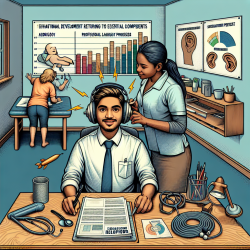In the realm of rehabilitation disciplines such as speech-language pathology and audiology, the conversation around the utilization of support personnel has been both ongoing and evolving. The groundbreaking study by Hagler et al. (1993), titled "Evaluation of the Report on the Role and Use of Support Personnel in the Rehabilitation Disciplines," provides critical insights and recommendations that are as relevant today as they were at the time of publication. This blog post aims to explore the key findings of the Hagler report and how practitioners can leverage these insights to improve their services, encourage further research, and ultimately enhance the quality of care provided to clients.
The Hagler report was commissioned against a backdrop of a chronic shortage of healthcare professionals in rehabilitation disciplines and a growing need for cost-effective expansion of healthcare services. The report's comprehensive approach to examining the utilization of support personnel across Canada was a pioneering effort aimed at addressing these challenges. It proposed the specification of appropriate job duties for support personnel, a proposal for a one-year generic college-level training program with both academic and clinical components, and minimum supervision standards for each discipline.
Key Findings and Recommendations
The Hagler report made several key recommendations that have the potential to significantly impact the delivery of speech-language pathology and audiology services:
- Specification of Job Duties: Clearly defining the roles and responsibilities of support personnel to ensure they complement the services provided by fully qualified professionals.
- Training Program: Establishing a one-year generic college-level training program that includes both academic and clinical components to prepare support personnel adequately for their roles.
- Supervision Standards: Setting minimum supervision standards to ensure that support personnel are adequately overseen by fully qualified professionals, thereby maintaining the quality of care.
The report emphasized the potential of support personnel to enhance service delivery by increasing the frequency, efficiency, and availability of services, assisting with the generalization of learned skills, and supporting habilitation and restorative programs. However, it also highlighted the importance of appropriate and adequate supervision by qualified professionals to ensure the quality of services is not compromised.
Implications for Practitioners
For practitioners in the fields of speech-language pathology and audiology, the Hagler report offers several actionable insights:
- Enhancing Service Delivery: By integrating support personnel into their practice, practitioners can extend the reach and efficiency of their services, allowing them to focus on more complex cases or tasks that require their specialized expertise.
- Focus on Supervision: The report underscores the critical role of supervision in the effective utilization of support personnel. Practitioners must ensure that they provide adequate supervision, aligning with the recommendations of the report and the standards set by their professional associations.
- Professional Development: The recommendations regarding the training and supervision of support personnel highlight the need for ongoing professional development for both support personnel and the professionals who supervise them. Practitioners should seek out or provide training opportunities that align with the report's recommendations.
- Advocacy and Policy Development: Practitioners can use the findings of the Hagler report as a basis for advocacy efforts aimed at influencing policy development and standards for the utilization of support personnel in their fields. This includes engaging with professional associations, regulatory bodies, and educational institutions.
Encouraging Further Research
While the Hagler report provides a solid foundation, there is a continuous need for further research to adapt to the evolving landscape of healthcare and education. Practitioners are encouraged to engage in or support research efforts that explore new models of service delivery, the effectiveness of support personnel in various settings, and the long-term outcomes of services provided with the assistance of support personnel.
In conclusion, the Hagler report offers valuable insights into the role and use of support personnel in the rehabilitation disciplines of speech-language pathology and audiology. By implementing the outcomes of the research presented and encouraging further research, practitioners can improve their skills, enhance the quality of their services, and contribute to the advancement of their fields. The potential benefits of support personnel, when appropriately trained and supervised, are immense, offering a pathway to more accessible, efficient, and effective rehabilitation services.
To read the original research paper, please follow this link: Evaluation of the Report of the Role and Use of Support Personnel in the Rehabilitation Disciplines (Hagler et al., 1993).










